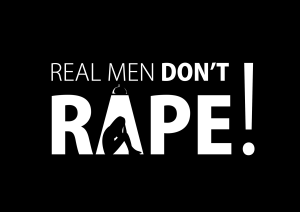This video is part of a series for Everyday Feminism, an online magazine that helps people address the violence, discrimination, and marginalization that they face through applied intersectional feminism.
Today, I want to talk a little bit about victim blaming and rape culture. I get a lot of comments from people saying that rape culture doesn’t exist in the Western world because we have laws against rape and we punish rapists here – which is true that we have laws against rape, but that doesn’t mean that those laws are necessarily effective, because the vast majority of rapists never see jail time.
That isn’t what I want to talk about today, because that’s a whole other subject in itself. If you want to hear more about the legalities surrounding sexual assault, I’ll link to some videos where I discuss this more below.
Something super important that I want to point out is that rape culture doesn’t necessarily mean that we as a society condone the act of rape or think that it’s good.
What rape culture does mean is that we normalize rape and we make excuses for rape. We blame rape survivors from their own victimization, and we tell women that because they didn’t behave or dress in a certain way, that it’s their own fault for being sexually assaulted.
It didn’t always used to be this way. Wait, no, it totally did.
I’m going to share with you guys some old school examples of victim blaming, or, in some of these cases, Old Testament. I think it’s important that we examine the history of rape culture critically because then we can further examine what our current ideas about sexual assault are actually based on.
Let’s go to ancient Babylon 4,000 years ago. The Code of Hammurabi, or Hammurabi’s Code, was a set of nearly 300 laws governing ancient Mesopotamia. This code laid out everything from a range of punishments based on social status to how much money you should pay your ox driver.
This is also where we get the popular saying, “an eye for an eye, a tooth for a tooth.” What does one of the first sets of written laws have to say about rape?
If you were a virgin who was raped, then it was considered property theft against your father and the rapist was to be captured and killed. If you were a married woman, regardless of your lack of consent, you were considered an adulteress and had to share the punishment with your attacker, which at that time period meant being bound and thrown into the river.
Why is this relevant today? This might seem like an extreme example if it wasn’t something that’s still happening. Obviously not the being bound and throw into the river part, but the chastising of women’s sexuality.
Our views of virginity and women’s sexuality aren’t terribly different from ancient Babylonian times.
Also, a quick note. I acknowledge that virginity is a made-up social construct that ignores the sexualities of queer and trans people and other sexual minorities, but I’m also recognizing that this construct did and continues to have very real effects on the lives of women in the past and present.
Today if a rape survivor is expected to be taken seriously, then they need to be considered a “respectable woman.” This is why we see so many questions of a promiscuity brought into play if she chooses to make allegations against her rapist.
If a woman is promiscuous or has too many sexual partners, then people make excuses for her assault because she was “asking for it.” The basic message behind this is that a sexually active woman doesn’t deserve to be in control of her own sexuality and her own body. If she is violated, then it’s her own fault for ever having been sexual in the first place.
Now let’s take a look at the ancient Hebrews. According to Deuteronomy, married Hebrew women were also to be held similarly responsible from their own violation. However, even a woman who was a virgin risked death by stoning if her attack happened within city walls. The reasoning behind this is that if she had screamed for help, then someone would have heard and come to her rescue.
Flash forward to 12th century England, where King Henry II wrote similar instructions for the way the courts should deal with the sexual assault of virgin women. According to King Henry, a rape survivor was to go at once while the dead is newly done to the neighboring townships and there show the injury done to her to men of good repute, the blood and her clothing stained with blood, and her torn garments.
While the idea of a rape survivor being forced to run yelling through the streets immediately after such a traumatic experience, and then go show a group of men her bloodied clothing sounds awful, this is essentially what rape survivors are expected to do today. Rape survivors are supposed to immediately collect evidence of their attack if they ever plan on testifying against their perpetrator. If they wait too long to testify, then it evokes suspicion about their motives. The reasoning that a rape survivor could have prevented their attack by screaming for help only mirrors modern day victim blaming with statements like, “Why didn’t you call for help or fight back?” It places the blame on the survivor for their own violation rather than on the perpetrator who violated them.
The last example I want to talk about is the infamous story of Potiphar’s wife in the Bible. I might be saying Potiphar wrong. Potiphar’s wife is basically depicted as being very sexual and lusting over one of her slaves. When the slave rejects her, Potpihar’s wife, who of course is unnamed, accuses him of sexually assaulting her.
The story of a woman crying rape is popular in a lot of other folklore, including the Koran, Celtic myths, and Egyptian folklore. The narrative of a vindictive woman who uses rape as the tool of revenge is still a popular stereotype today.
It’s also important to note that false rape accusations are relatively rare. The FBI estimates between 2% and 8%, which, by the way, is less than false accusations of theft, which the FBI estimates at 10%. But nobody ever stereotypes robbery victims as vindictive liars.
What’s particularly dangerous about this myth is that it paints rape survivors who try and report their assault as untrustworthy, making it even harder for them to get any sort of justice. It also shows the historic concern that the biggest victims of rape culture are the hordes of upstanding men being falsely accused left and right, rather than, you know, the actual survivors of rape.
Anyway, I think that these historic examples are extremely telling about where our current attitudes about sexual assault come from, and also pretty frightening when we consider how little we progressed in the last 4,000 years.
This is why it’s so important that we view modern day victim blaming in a larger context and not as something that’s just a recent phenomenon, but something that’s been occurring throughout most of, if not all of, human history.
We also need to be conscious of modern victim blaming when we see it and call it out whenever possible. We need to critique our cultural attitudes, our legal system, and any part of society that allows rape culture to happen in order to create change and to challenge our culture of violence.
It was a dark, deep hole, just like where my heart should be.




















